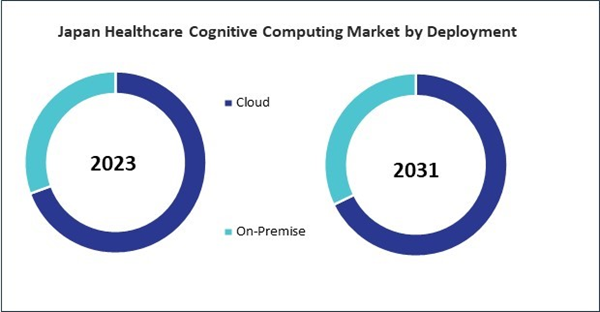The China market dominated the Asia Pacific Healthcare Cognitive Computing Market by Country in 2023, and is expected to continue to be a dominant market till 2031; thereby, achieving a market value of $3.91 billion by 2031. The Japan market is registering a CAGR of 26% during 2024-2031. Additionally, the India market would capture a CAGR of 27.7% during 2024-2031.
The adoption of cognitive computing in healthcare is rapidly growing due to its potential to revolutionize patient care, streamline operations, and enhance medical research. The proliferation of electronic health records (EHRs) and digital health records has created vast amounts of data. Cognitive computing systems are increasingly adopted to manage, analyze, and extract actionable insights from this diverse and growing data pool. The rise of wearable health devices and Internet of Things (IoT) technologies generates real-time health data. Cognitive computing systems leverage this data to monitor and support personalized care, driving adoption continuously.
There is a growing demand for personalized medicine, which tailor treatments based on individual patient data, including genetics and lifestyle. Cognitive computing enables the analysis of complex datasets to develop personalized treatment strategies, making it a key driver for adoption. Cognitive computing supports precise and personalized diagnostics by analyzing patient-specific information and offering insights that help diagnose and treat conditions more effectively.
In China, wearable health devices equipped with cognitive computing capabilities are on the rise. These devices continuously monitor vital signs and other health parameters of elderly individuals, enabling real-time data collection and analysis to support proactive healthcare. Cognitive computing technologies facilitate remote health monitoring for the elderly in China, allowing healthcare providers to track health conditions from a distance. This approach helps manage chronic diseases and provides timely medical support to elderly patients with mobility issues. In conclusion, the rising hospital and diagnostics sector and the prevalence of chronic diseases in the region are driving the market’s growth.
List of Key Companies Profiled
- Microsoft Corporation
- IBM Corporation
- NVIDIA Corporation
- Intel Corporation
- GE HealthCare Technologies, Inc.
- Medtronic PLC
- Oracle Corporation
- Google LLC
- Cisco Systems, Inc.
- Amazon Web Services, Inc.
Market Report Segmentation
By Deployment
- Cloud
- On-Premise
By Technology
- Natural Language Processing
- Machine Learning
- Automated Reasoning
- Information Retrieval
By Country
- China
- Japan
- India
- South Korea
- Singapore
- Malaysia
- Rest of Asia Pacific
Table of Contents
Companies Mentioned
Some of the key companies profiled in this Asia-Pacific Healthcare Cognitive Computing market report include:- Microsoft Corporation
- IBM Corporation
- NVIDIA Corporation
- Intel Corporation
- GE HealthCare Technologies, Inc.
- Medtronic PLC
- Oracle Corporation
- Google LLC
- Cisco Systems, Inc.
- Amazon Web Services, Inc.









